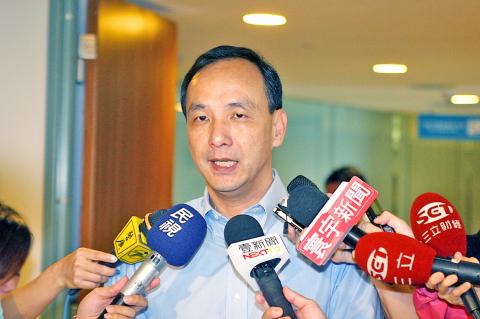A survey released yesterday showed that the public finds New Taipei City Mayor Eric Chu (朱立倫) of the Chinese Nationalist Party (KMT) more “presidential” than the other five heads of the nation’s six municipalities, including Taoyuan County, which is to become the sixth special municipality on Dec. 25.
The poll asked respondents who among the six local government heads was the “most presidential,” with the results giving Chu 27.9 percent of the votes, ahead of 21.8 percent for Greater Tainan Mayor William Lai (賴清德) of the Democratic Progressive Party (DPP) and 13.2 percent for Greater Kaohsiung Mayor Chen Chu (陳菊), also of the DPP.
Of those polled, only 4.8 percent considered Taipei Mayor Hau Lung-bin (郝龍斌) of the KMT to be most presidential, while Greater Taichung Mayor Jason Hu (胡志強) of the KMT got 6.3 percent of the vote and Taoyuan County Commissioner John Wu (吳志揚) of the KMT got just 1 percent.

Photo: Lai Hsiao-tung, Taipei Times
However, DPP Chairperson Tsai Ing-wen (蔡英文) and Vice President Wu Den-yih (吳敦義), both aspirants for the next presidential election in 2016, were not included in the poll as possible candidates in the race.
The survey showed that the public overwhelmingly favored Chu to represent the KMT to run for president, said Chen Tung-hao (陳東豪), vice president of Chinese-language weekly The Journalist.
A total of 6,418 people aged 20 or above living in the six special municipalities, accounting for more than 70 percent of the nation’s population, were polled earlier this month by the survey conducted by Taiwan Indicators Survey Research (TISA).
The survey showed that in the Taipei mayoral election in November, independent candidate Ko Wen-je (柯文哲), who could represent the DPP, may be able to edge out Sean Lien (連勝文) of the KMT and win the election, with Ko’s support rating measured at 41.4 percent against Lien’s 40.1 percent.
If the DPP nominated another hopeful, DPP Legislator Pasuya Yao (姚文智), Lien won 37 percent of the vote against Yao’s 31.1 percent, the survey showed.
“There’s a 99 percent chance I will run in the mayoral election were it contested between Lien and Ko,” former DPP legislator Shen Fu-hsiung (沈富雄) said at the press conference where the poll results were released.
Citing a finding of the survey that in Taipei’s Daan (大安) and Wenshan (文山) districts, traditional KMT strongholds, Ko had an edge with 42.2 percent support over Lien’s 38.3 percent, Shen said the result showed that pan-blue voters are more likely not to vote in the election than vote for Lien.
Shen said that Lien was not considered to be a candidate who can adequately address the three major issues that concern people most — the skyrocketing cost of housing, the widening income gap and social divisions.
Public opinion reflected in the survey showed that, in the worst-case scenario, the KMT could lose both the Taipei mayoral election and the Greater Taichung mayoral election in November, KMT Legislator Apollo Chen (陳學聖) said.
Apollo Chen said he has heard traditional KMT supporters saying that they would “teach the KMT a lesson” in the year-end elections.
The survey found that the DPP’s Greater Taichung mayoral candidate, Legislator Lin Chia-lung (林佳龍), led Hu by 42.6 percent to 32 percent.
Both Lai and Chen Chu should have comfortable victories over their KMT rivals in the elections, while the DPP’s candidate for New Taipei City, former premier Yu Shyi-kun, received between 20 and 30 percent support against an unnamed KMT candidate, the survey showed.

A strong continental cold air mass is to bring pollutants to Taiwan from tomorrow, the Ministry of Environment said today, as it issued an “orange” air quality alert for most of the country. All of Taiwan except for Hualien and Taitung counties is to be under an “orange” air quality alert tomorrow, indicating air quality that is unhealthy for sensitive groups. In China, areas from Shandong to Shanghai have been enveloped in haze since Saturday, the ministry said in a news release. Yesterday, hourly concentrations of PM2.5 in these areas ranged from 65 to 160 micrograms per cubic meter (mg/m³), and pollutants were

Taiwan’s armed forces have established response protocols for a wide range of sudden contingencies, including the “Wan Chun Plan” to protect the head of state, the Ministry of Defense (MND) said today. After US President Donald Trump on Saturday launched a series of airstrikes in Venezuela and kidnapped Venezuelan President Nicolas Maduro, concerns have been raised as to whether China would launch a similar “decapitation strike” on Taiwan. The armed forces regularly coordinate with relevant agencies and practice drills to ensure preparedness for a wide range of scenarios, Vice Minister of National Defense Hsu Szu-chien (徐斯儉) told reporters before a

EVA Airways on Saturday said that it had suspended a pilot and opened an investigation after he allegedly lost his temper and punched the first officer several times as their plane was taxiing before takeoff at Los Angeles International Airport. According to a report published on Thursday by The Reporter, the incident occurred after the flight’s Malaysian first officer tried to warn the Taiwanese pilot, surnamed Wen (文), that he was taxiing faster than the speed limit of 30 knots (55.6kph). After alerting the pilot several times without response, the first officer manually applied the brakes in accordance with standard operating

Japanese Councilor Hei Seki (石平) on Wednesday said that he plans to visit Taiwan, saying that would “prove that Taiwan is an independent country and does not belong to China.” Seki, a member of the Japan Innovation Party, was born in Chengdu in China’s Sichuan Province and became a naturalized Japanese in 2007. He was elected to the House of Concilors last year. His views on the Chinese Communist Party (CCP) — espoused in a series of books on politics and history — prompted Beijing to sanction him, including barring Seki from traveling to China. Seki wrote on X that he intends